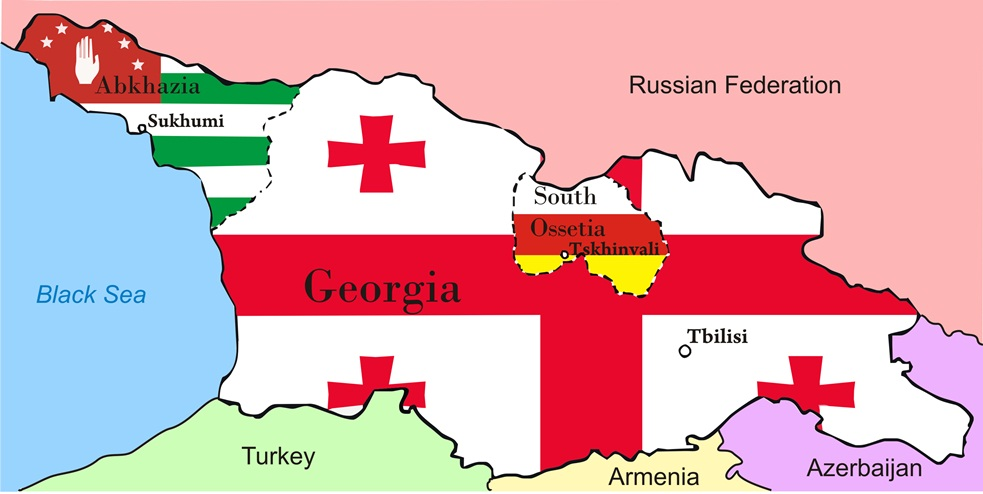Written by Naja Bentzen
| 6 language versions available in PDF format
Assoziierungsabkommen EU-Georgien El Acuerdo de Asociación UE – Georgia Accord d’association UE-Géorgie Accordo di associazione UE-Georgia |
Since the 2003 Rose Revolution, Georgia has continually strengthened its ties with the EU. The June 2014 signature of the EU-Georgia Association Agreement sparked increasing Russian pressure on the beleaguered government in Tbilisi over its pro-European foreign policy course.
Milestones and obstacles on Georgia’s European path
Georgia has made steady progress on its pro-Western course since 1992, when the country regained sovereignty after the collapse of the Soviet Union. Ties with the EU intensified after the ‘Rose Revolution’ in 2003, and Tbilisi has worked consistently towards political and economic reforms, supported by the EU within the Eastern Partnership (EaP), part of the European Neighbourhood Policy (ENP). Since elections in 2012 and 2013, the new ruling Georgian Dream (GD) coalition has maintained Tbilisi’s Euro-Atlantic course, despite growing rifts within the GD and increasing tensions with ex-President Mikheil Saakashvili and his opposition party, the United National Movement. Georgia and the EU signed an Association Agreement (AA) on 27 June 2014. On 17 November, the EU-Georgia Association Council – chaired by EU High Representative Federica Mogherini – held its first meeting, and the Council of the EU confirmed that Georgia could progress to the second phase of the Visa Liberalisation Action Plan working towards visa free travel.
What does the EU-Georgia Association Agreement entail?

The EU-Georgia AA is part of a new generation of Association Agreements with EaP countries. Its Deep and Comprehensive Free Trade Area (DCFTA) goes further than most FTAs, with elimination of non-tariff barriers and regulatory alignment, as well as binding rules on investment and services. The AA/DCFTA aims to integrate Georgia into the single market, with priorities for cooperation in areas such as foreign and security policy as well as justice and freedom, leaving ‘open the way for future progressive developments’. Parts of the AA/DCFTA have been applied provisionally since 1 September. The EU-Georgia AA is the third of its kind that the European Parliament is asked to ratify, following the AAs with Ukraine and Moldova. Georgia ratified the AA on 18 July. To come into force, the AA must also be ratified by all EU Member States.
Moscow increases pressure on Georgia amid growing rifts in Tbilisi
On 24 November 2014, Russia and Georgia’s breakaway region Abkhazia signed a ‘strategic partnership‘ deal, significantly expanding Moscow’s military and economic control over the region. Western leaders, including Mogherini, denounced the move as a violation of Georgia’s sovereignty and territorial integrity. While Tbilisi condemned the alleged ‘Russian reaction’ to the AA as ‘another step towards annexation’, Georgia’s opposition sees the treaty as evidence of the government’s failure to counter Russia, further deepening political divides in Tbilisi. The situation in Georgia is growing in urgency given Russia’s annexation of Crimea in March 2014. Russian troops have been stationed in Abkhazia since the early 1990s, with tensions looming since the 2008 war over Abkhazia and South Ossetia, recognised by Moscow as independent states.
The European Parliament and Georgia:On 17 November, the Foreign Affairs Committee voted to recommend that the EP approve the EU-Georgia AA (2014/0086(NLE)) and on the accompanying motion for resolution (2014/2816(INI), in which the EP notes Georgia’s ‘European perspective’, ‘reaffirms its support for the sovereignty and territorial integrity of Georgia and calls for the EU to ensure the applicability of the Agreement to the whole territory of Georgia’, calls for ‘the EU to continue to engage actively in conflict resolution, through the EU Special Representative for the South Caucasus and the Crisis in Georgia and through the EU Monitoring Mission (EUMM)’, and urges the creation of a ‘specific EU-Georgia parliamentary association committee’. In its resolution of 17 April 2014 on Russian pressure on EaP countries, the EP stated that ‘Russia is still occupying the Georgian regions of Abkhazia and Tskhinvali/South Ossetia, in violation of the fundamental norms and principles of international law’. In its 2012 resolution on the Georgia elections, the EP called on Russia ‘to withdraw its troops from the breakaway Georgian territories of Abkhazia and South Ossetia’. |








Reblogged this on Oxtapus *blueAction.